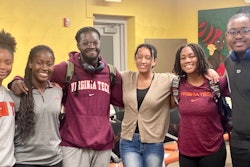Higher education is expecting a ruling from the U.S. Supreme Court in the Students for Fair Admissions (SFFA) v. Harvard College and SFFA v. University of North Carolina (UNC) Chapel Hill cases argued Oct. 31, 2022.
The cases, led by anti-affirmative action activist and SFFA President Edward Blum, allege these institutions discriminated against Asian American applicants by unfairly prioritizing underrepresented minority applicants in violation of the Civil Rights Act of 1964. The ruling will decide whether private and public postsecondary institutions in the U.S. will be able to use race as a consideration in their admissions processes.
“The best-case scenario here would be for the court to affirm its longstanding precedent and uphold both Harvard and UNC’s minimal consideration of race as just one of dozens of factors that the schools consider in admissions,” said Michaele Turnage Young, senior counsel at the Legal Defense Fund. “But there are a wide range of potential outcomes that are less favorable.”
The ruling could come any time before June 2023. If the Supreme Court rules in Harvard and UNC’s favor, then it would uphold current law and affirm lower court rulings, Turnage Young said. But, if the court rules in favor of SFFA, it would overturn 44 years of precedent that affirmed the educational value of diversity.
“This outcome would be a radical act by the court, which is supposed to respect its own precedents, especially precedents like this one that were recently affirmed,” said Turnage Young, citing the 2016 Fisher v.. The University of Texas case on race-conscious admission, also led by Edward Blum. “Alternatively, the court could decline the SFFA’s invitation to impose an outright ban on the consideration of race in admissions and instead tweak existing law in some way, perhaps holding, for example, that it is legally permissible for some, but not all, colleges to consider race in admissions."
Because of the many ways the court can decide to rule, institutions of higher education may feel unsure how to prepare for its impact. But experts say that there is still work institutions can do while waiting for the final ruling, including evaluating their admissions to look for ways to minimize racial bias in the application process and preparing for external or internal overreaction to any change to precedent.
 Thomas A. Saenz
Thomas A. Saenz






















